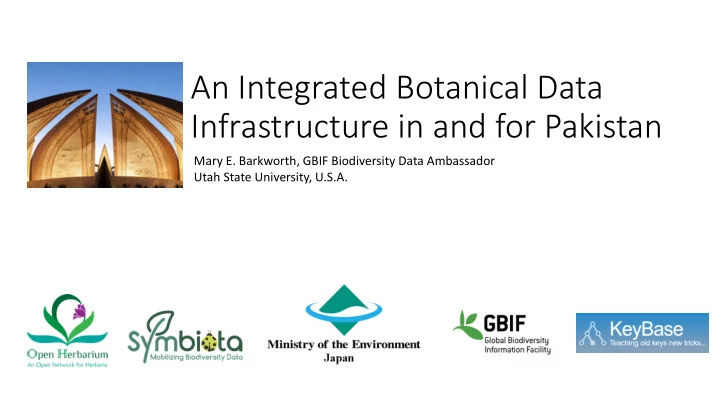

An Integrated Botanical Data Infrastructure in and for Pakistan Mary E. Barkworth, GBIF Biodiversity Data Ambassador Utah State University, U.S.A.
Infrastructure Civil infrastructure: Roads, bridges, laws, schools, water, electricity, sewage systems, internet, ….. Botanical Infrastructure Herbaria, floras, nomenclatural code, microscopes, computers, cameras, … PEOPLE, knowledgeable and interested individuals
PAST TECHNOLOGICAL REVOLUTIONS 1440+ Gutenberg 1500s Luca Ghini Mass production of Herbarium specimens books 1750s Linnaeus Identification tools
Digital Technology ENORMOUS quantities of data New cross-disciplinary connections Engage more people
G lobal The World’s B iodiversity Promoter of I nformation Data Sharing F acility
It starts in the field
Primarily for research – value dependent on For education, relaxation, and research – quality of data and specimen preservation value dependent on ability to attract, educate, and inspire Royal Botanic Gardens, Kew Botanical Garden of National Herbarium (part of PARC) https://slideplayer.com/slide/10723588/
Gardens Herbaria Few specimens – but living Many specimens – but dead • Engage • Fresh research • More diversity Generalize material public • Unchanging observations • Educate
Specimens • Initially • Research • Educate • Develop descriptions • Check identification • Prepare lists • Today • Effects of weather and climate • Invasiveness • Medicinal properties • Assessments of invasiveness • Quantitative assessment of species and phylogenetic diversity
Add – data mobilization GBIF: 116,040 records for Pakistan Most from Himalayan Upland Plant Database Quaid-i-Azam #3 contributor with 12,084
Need – high quality data Old New • Locality – nearest town • Where in town • Coordinates – latlon or absent • Georeference – latlon, datum, uncertainty, remarks • Scientific name • Scientific name and ID reference • Habitat, associated species, • Habitat, associated species, elevation, reproductive condition brief or absent. elevation, reproductive condition – most present with detail. Education about fieldwork is key
It starts in the field
Post keys & link to taxon pages Taxon pages Better field notes Data density dependent More collaborations Specimen heat maps Other benefits Vouchered checklists [Taxon & clade heat maps] Localized keys [Phenology predictor ]
Data Mobilization November 2018 Planned, November-December Current status • Start georeferencing ISL, SWAT, RAW • Herbarium records: 14027 • Start data capture • With coordinates: 149 • University of Peshawar YES! • Flora of Pakistan online: • University of Sindh, Jamshoro • Keys – 197, a few updated • ?University of Malakand • Specimen citations: 32,187 • Discussions with University of Karachi • Descriptions: Unknown • Register ICFP & initiate data capture • Images: Unknown • Beta release of SPINDLE • SPINDLE: in development
SPINDLE – Sylvia Kinosian, Will Pearse • Specimen Information Data Label Export • Offline tool • Capture data, generate label, generate csv file for upload to Symbiota • Version 1 for plants • Good for new and old collections • http://spindle-herbarium.com/ • Beta release late this year
Become a doer! • OpenHerbarium NEW • KeyBase CHALLENGE! • Become a doer • Data capture (At least 10 records) Build multi-access • Checklist creator (At least 25 species) identification key • Image provider (At least 5) • Collector (5 high quality specimens) • Choose one species • Download data from GBIF for world • Which institutions provide most records for Pakistan? Georeferenced records?
mary.barkworth@usu.edu
Recommend
More recommend